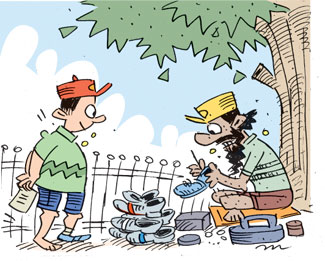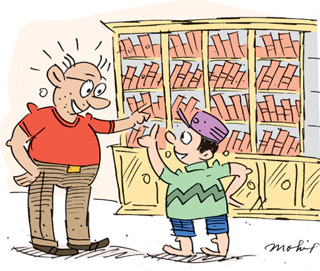|

by R. S. Karunaratne
Adverbial clauses
with ‘When’
and ‘While’
We use adverbial clauses beginning with ‘when’ to show two things
happening one immediately after the other.
The deer ran away when they saw the tiger.
|

The children were laughing while the clowns were performing.
|
Children ran towards the road when the perahera started.
She smiled when visitors came to the reception.
Teachers welcomed the new principal when he assumed duties.
I play the violin when I feel unhappy.
Sunday is the only day when I can relax.
There are times when I wonder why I do this job.
She went to Nuwara Eliya when the weather was fine.
How can I teach them English when they don’t listen?
We use ‘while’ at the beginning of an adverbial clause. The same
tense is used for the main clause and the adverbial clause.
Mother was cooking while the children were playing.
Darsha was swimming while Hema was reading a novel on the beach.
Fathima swam while his son fished.
It rained heavily while she slept.
While the mothers were chatting the children were learning English.
An adverbial clause beginning with ‘while’ is used to show two things
happening at the same time.
It was raining while they were returning home.
The children were laughing while the clowns were performing.
The girls are cooking while the boys are washing plates.
Some parents were talking while the chief guest was speaking.
The journalist interviewed the artist while the photographer took
photographs.
The tourists were robbed while they slept.
|

The cobbler mends your shoes while you wait.
|
While I waited for the train leaving for Colombo three trains went by
in the opposite direction.
The cobbler mends your shoes while you wait.
[Activity ]
Fill in the blanks with ‘when’ or ‘while’ and check your answers with
the key.
1. We were surprised ............. we heard of Sam’s death.
2. Shyama shouted for help .................. a cobra slithered towards
her.
3. Gnanam was drawing water from the well ................ his brother
was talking to a visitor.
4. Diana was singing a song ............. Kushani was playing the piano.
5. We serve customers ............... they wait.
6. People packed their belongings .................... the water rose.
7. Father brings us sweets .................... he returns home after
work.
8. We were surprised ................. we saw the soaring prices.
9. I feel happy ............... I think of my achievements.
10. Hema hugged her brother ......... she wished him good luck.
************
[Key]
1. when 2. when 3. while 4. while 5. while 6. while 7. when 8. when
9. when 10. when
************
Starters :
Use of ‘Any’
and ‘Anybody’
‘Any’ means ‘some’, or even the smallest amount or number of
‘something’
There’s hardly anyone in the hall.
We have enough bread but there isn’t any butter.
|

You can pick up any book and read. |
I haven’t read any of his novels.
Now that he is dead we won’t have any trouble in the city.
I come to school to learn but not for any other reason.
We use ‘any’ when a particular person or thing is not important.
We can eat anything when we are hungry.
A: Which shirt do you want to buy?
B: Any.
You can pick up any book and read.
When I am at home I wear any old thing.
Any idiot will know how to do this.
‘Anybody’ means ‘anyone’.
Anybody can sit here.
Is there anybody who knows the answer?
She doesn’t speak to anybody in office.
Anybody can come to my birthd ay party.
We use ‘any’ in certain questions.
Is there any ice-cream in the fridge?
Did you make any mistake?
Are you doing anything special tomorrow?
[Activity ]
Put in ‘some’ or ‘any’ in the blanks. Check your answers with the
key.
1. I’m going to buy ................ books.
2. Luckily, they haven’t made ..........mistakes.
3. I’ll pay the bill. I’ve ............... money.
4. There aren’t ................. schools in this town.
5. They haven’t got ................ children.
6. There are ............... children in the park.
7. Are there ................... letters for me?
8. I want to post this letter but I haven’t got ..................
stamps.
9. Do you know .................. music teacher?
10. She went to the supermarket to buy ................... vegetables.
**********
[Key ]
1. some 2. any 3. some 4. any 5. any 6. some 7. any 8.any 9. any 10.
some
**********
Verbal ability
Here is a quiz to test your verbal ability. Each of the following
words is followed by three words or phrases.
The correct choice is the word or phrase whose meaning is nearly
opposite to the meaning of the words in bold type. Check your answers
with the key.
1. Benediction (a) yell (b) scream (c) curse
2. Valour (a) valuation (b) cowardice (c) invasion
3. Bisect (a) join (b) cut (c) insect
4. Covenant (a) condemnation (b) breach (c) inference
5. Currency (a) change (b) old-fashioned (c) coin
6. Cyclic (a) linear (b) square (c) spiral
7. Valedictory (a) contradictory (b) salutation (c) beginning
8. Nemesis (a) saviour (b) colleague (c) player
9. Fuse (a) diffuse (b) suffuse (c) separate
10. Vertical (a) diagonal (b) horizontal (c) flat
11. Fidelity (a) faithlessness (b) divorce (c) distemper
12. Colloquial (a) slang (b) happy (c) formal
13. Impelled (a) unaware (b) reluctant (c) timid
14. Extrovert (a) pervert (b) introvert (c) subvert
15. Plethora (a) modicum (b) enigma (c) shortage
*********
[Key ]
1. (c) 2. (b) 3. (a) 4. (b) 5. (c) 6. (a) 7. (b) 8. (a) 9. (c) 10.
(b) 11. (a) 12. (c) 13. (b) 14. (b) 15. (c)
*********
A test of verbal speed
In no more than five minutes decide whether the words in column ‘A’
are the same or opposite in meaning to the words in column ‘B’. Write
‘S’ if same or ‘O’ if opposite. Check your answers with the key.
Column ‘A’ :
1. Sweet
2. Crazy
3. Stout
4. Big
5. Danger
6. Splendid
7. Love
8. Stand
9. Furious
10. Doubtful
11. Handsome
12. Begin
13. Strange
14. Male
15. Powerful
16. Live
17. Come
18. Open
19. Want
20. Rich
Column ‘B’:
A. sour
B. insane
C. fat
D. small
E. peril
F. magnificent
G. hate
H. sit
I. violent
J. certain
K. ugly
L. start
M. familiar
N. female
O. weak
P. die
Q. go
R. close
S. need
T. poor
---------
[Key ]
*********
O, 2. S, 3. S, 4. O, 5. S, 6. S, 7. O, 8. O, 9. S, 10. O, 11. O, 12.
S, 13. O, 14. O, 15. O, 16. O, 17. O, 18. O, 19. S, 20. O
*********** |

